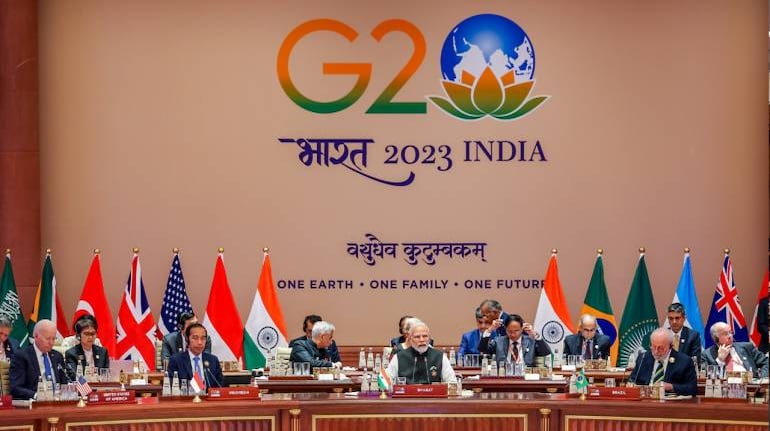
Foreign minister S Jaishankar and finance minister Nirmala Sitharaman while speaking about the G20 leaders’ joint statement had adopted a cautious tone at the pre-summit media briefing. The high point of the New Delhi Leaders’ Declaration that got adopted on the first day of the summit meeting on Saturday in New Delhi instead of on the culminating day, that is Sunday, did not carry the much expected dissent and divergence over Ukraine, the most contested issue on the table.
There appeared a sense of relief that India’s presidency of G20 is nearing its end on a positive note, and the triumphal tone, which is the general characteristic of Prime Minister Narendra Modi’s leadership style, was absent.
G20 Summit 2023 Live: Biden, Sunak to leave Delhi today, PM to meet Macron
The 83-para Delhi declaration, of which only eight dealt with Ukraine, was comprehensive but with enough shifts and nuances in emphasis. The focus was on the 2030 agenda of meeting the Sustainable Development Goals (SDGs) and of meeting the Paris Climate Summit Agreement on restricting the rise of mean global temperature to 1.5 Degrees Celsius from pre-industrial levels and in curbing the greenhouse gas (GHG) emission and all other means to achieve it, and of referring to the private sector as an important player in the struggle against climate change.
It ticked all the boxes that needed to be covered, especially the global economy, including reforming the multilateral development banks (MDBs), of keeping the World Trade Organisation (WTO) as the fulcrum, and getting the poorer countries a say on terms of international trade, on pushing public digital infrastructure which would speed up the development process and also be environment-friendly. Global South issues form part of the declaration, and this is seen as India’s and Modi’s, contribution to the Delhi G20 summit.
Making The Delhi Declaration Possible
Answering insistent questions on the Ukraine issue, and how it was resolved to arrive at a consensus, Jaishankar told the media that what is in the G20 Delhi declaration is different from what was in Bali declaration because Bali was a year ago, and the situation surrounding Ukraine had changed.
First, it is acknowledged that G20 is not the right forum to address the Ukraine issue because the group is “the premier forum for international economic cooperation”. But the war had an impact because food, fertilizer and fuel supplies from Russia and Ukraine got disrupted, and the poor countries which are dependent on these exports are facing a crisis.
Also Read: G20 leaders’ declaration commits to halving digital gender gap by 2030
In Bali, it was a sense of outrage over the Russian invasion of Ukraine. It has now changed into the global economic impact of the war in Ukraine.
Jaishankar said that it was the efforts of the emergent economies of G20 which carried the day, and that there was close consultation between Indonesia which was the G20 president in 2022, India, and Brazil, which will succeed India in 2024.
This effectively eliminated any role for the United States though Treasury Secretary Janet Yellen and National Security Advisor Jake Sullivan expressed a desire to help India in ironing out the difficulties. It is quite probable that Prime Minister Modi had persuaded President Joe Biden to accept the formulation on Ukraine during their bilateral meeting on Friday evening.
Ukraine: Strategic Stalemates Helped India
The statement emphasized the revival of the Turkiye and United Nations mediated accord with Russia allowing the Ukraine to export grain and fertilizer through its Black Sea ports, which ended in March this year and which Russia is refusing to renew. There is a specific plea over waging the war.
The declaration says, “In this context, emphasizing the importance of sustaining food and energy security, we called for the cessation of military destruction or other attacks on relevant infrastructure.” And secondly, there is the prescription about the limits to the extent of the war: “The use or threat of use of nuclear weapons is inadmissible.”
It would appear that the G7 countries did not want to sound belligerent over Russia and they did not want to make India’s task as host of the summit difficult or embarrassing. And this seemed more so after China’s tough posturing. Beijing sensed that it might be alienating more countries if its stance towards India appeared hostile. The Chinese foreign ministry spokeswoman Mao Ning said that China would like to cooperate with other countries to find solutions.
The G7 approach to the Russia-Ukraine war has changed significantly since February 2002 when Russian President Vladimir Putin unleashed the invasion. He had not succeeded in subduing Ukraine. His war plan has backfired. But the US, the UKand the European Union too have not succeeded in squeezing Russia through economic sanctions to inflict a military defeat. The strategic stalemate has in a way helped India to cross the Ukraine hurdle in preparing the Delhi declaration of G20.
Parsa Venkateshwar Rao Jr is a New Delhi-based journalist. Views are personal, and do not represent the stand of this publication.
Discover the latest business news, Sensex, and Nifty updates. Obtain Personal Finance insights, tax queries, and expert opinions on Moneycontrol or download the Moneycontrol App to stay updated!